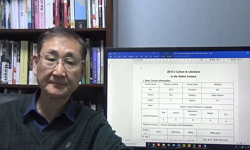It is not that rare case that students have difficulty using Japanese compound verbs even when they know the meaning of them. This is closely related to the situation in which they lack the knowledge about the prototypical context. To support the stud...
http://chineseinput.net/에서 pinyin(병음)방식으로 중국어를 변환할 수 있습니다.
변환된 중국어를 복사하여 사용하시면 됩니다.
- 中文 을 입력하시려면 zhongwen을 입력하시고 space를누르시면됩니다.
- 北京 을 입력하시려면 beijing을 입력하시고 space를 누르시면 됩니다.
부가정보
다국어 초록 (Multilingual Abstract)
It is not that rare case that students have difficulty using Japanese compound verbs even when they know the meaning of them. This is closely related to the situation in which they lack the knowledge about the prototypical context. To support the students in this respect, it is necessary to be able to analyze the general context in which Japanese compound verbs are used. Analyzing the context systematically requires a methodology which enables it. This paper focused on the usage of the Japanese compound verbs involved with evaluative meaning and tested whether it"s possible to analyze the context in terms of the evaluative aspects. To do that, appraisal theory proposed by Martin&White (2005) was adopted. The theory was developed in the context of systemic functional grammar. One of Japanese compound verbs, kazaritateru, was analyzed as a case study. Through the analysis, it was revealed that the evaluative meaning of kazaritateru is closely related to the context in terms of its evaluative aspects. Chapter 2 and 3 showed that the distribution of the expressions involved with attitude system is co-related with its usage. Also, It was observed that the percentage of the expressions involved with engagement system is different depending on the usage of kazaritateru. This reflects that the characteristics of the text could be different when its expected readers are different. In chapter 4, it was briefly examined how this approach could be applied to the education of Japanese compound verbs which have evaluative meaning. This paper suggested that the methodology adopted here could be used to the education of Japanese compound verbs.
목차 (Table of Contents)
- Abstract
- 1. 問題の所在
- 2. 分析の?象と理論的?組み
- 3. 分析
- 4. ディスカッション
- Abstract
- 1. 問題の所在
- 2. 分析の?象と理論的?組み
- 3. 分析
- 4. ディスカッション
- 5. 日本語複合動詞の?育との?連性
- 6. まとめ
- ?考文?
- REFERENCES
참고문헌 (Reference)
1 林 宅男, "談話分析のアプローチ" 研究社 2011
2 籾山洋介, "認知言語学論考 No.9" ひつじ書房 1-37, 2010
3 小泉 保, "言語研究における機能主義" くろしお出版 2000
4 高見健一, "現代言語学の潮流" 勁草書房 80-92, 2003
5 岡本雅史, "比喩表現における意味論的主観性と語用論的主観性" 2 : 9-16, 2007
6 松田文子, "日本語複合動詞の習得研究" ひつじ書房 2004
7 森田良行, "動詞・形容詞・副詞の辞典" 東京党出版 2008
8 龍城正明, "ことばは生きている─選択体系機能言語学序説" くろしお出版 2006
9 Langacker, Ronald W., "Usage-based models of language" CSLI Publications 1-63, 2000
10 Swain, Elizabeth, "Thresholds and Potentialities of Systemic Functional Linguistics" EUT Edizioni Università di Trieste 291-317, 2010
1 林 宅男, "談話分析のアプローチ" 研究社 2011
2 籾山洋介, "認知言語学論考 No.9" ひつじ書房 1-37, 2010
3 小泉 保, "言語研究における機能主義" くろしお出版 2000
4 高見健一, "現代言語学の潮流" 勁草書房 80-92, 2003
5 岡本雅史, "比喩表現における意味論的主観性と語用論的主観性" 2 : 9-16, 2007
6 松田文子, "日本語複合動詞の習得研究" ひつじ書房 2004
7 森田良行, "動詞・形容詞・副詞の辞典" 東京党出版 2008
8 龍城正明, "ことばは生きている─選択体系機能言語学序説" くろしお出版 2006
9 Langacker, Ronald W., "Usage-based models of language" CSLI Publications 1-63, 2000
10 Swain, Elizabeth, "Thresholds and Potentialities of Systemic Functional Linguistics" EUT Edizioni Università di Trieste 291-317, 2010
11 Martin, J.R., "The Language of Evaluation: Appraisal in English" Palgrave Macmillan 2005
12 White, P. R. R., "Beyond Modality and Hedging: a dialogic view of the language of intersubjective stance" 1-25, 2003
13 Halliday, M. A. K., "An Introduction to Functional Grammar" Edward Arnold 2004
동일학술지(권/호) 다른 논문
-
- 대한일어일문학회
- 孔美熙
- 2014
- KCI등재
-
- 대한일어일문학회
- 權奇洙
- 2014
- KCI등재
-
- 대한일어일문학회
- 金銀淑
- 2014
- KCI등재
-
- 대한일어일문학회
- 李亭夏
- 2014
- KCI등재
분석정보
인용정보 인용지수 설명보기
학술지 이력
| 연월일 | 이력구분 | 이력상세 | 등재구분 |
|---|---|---|---|
| 2026 | 평가예정 | 재인증평가 신청대상 (재인증) | |
| 2020-01-01 | 평가 | 등재학술지 유지 (재인증) |  |
| 2017-01-01 | 평가 | 등재학술지 선정 (계속평가) |  |
| 2016-01-01 | 평가 | 등재후보학술지 유지 (계속평가) |  |
| 2015-12-01 | 평가 | 등재후보로 하락 (기타) |  |
| 2011-01-01 | 평가 | 등재학술지 유지 (등재유지) |  |
| 2009-01-01 | 평가 | 등재학술지 유지 (등재유지) |  |
| 2006-01-01 | 평가 | 등재학술지 선정 (등재후보2차) |  |
| 2005-01-01 | 평가 | 등재후보 1차 PASS (등재후보1차) |  |
| 2003-01-01 | 평가 | 등재후보학술지 선정 (신규평가) |  |
학술지 인용정보
| 기준연도 | WOS-KCI 통합IF(2년) | KCIF(2년) | KCIF(3년) |
|---|---|---|---|
| 2016 | 0.35 | 0.35 | 0.29 |
| KCIF(4년) | KCIF(5년) | 중심성지수(3년) | 즉시성지수 |
| 0.27 | 0.24 | 0.556 | 0.05 |





 KCI
KCI DBpia
DBpia






